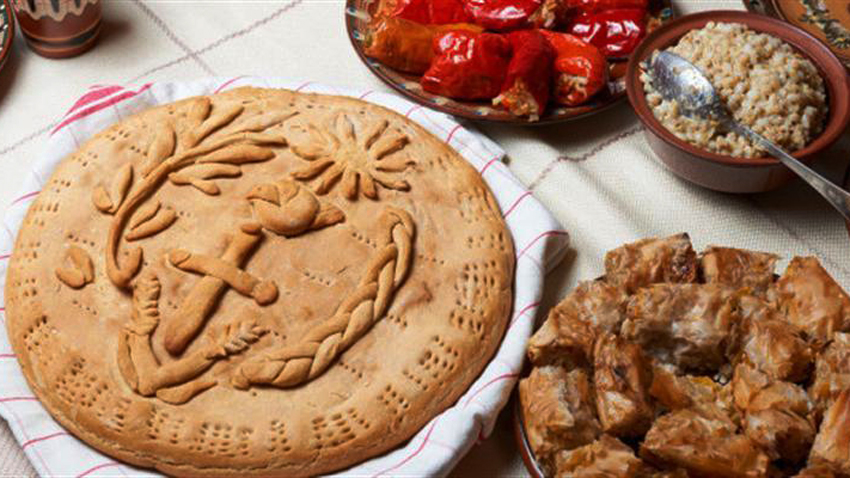Christmas Eve, a day of humility, thankfulness and hope. Though not all people in Bulgaria observe the Nativity fast throughout the entire period designated – 40 days - all families sit down to a festive meal together. To several generations, the people who grew up in the period from the 1940s till the 1980s, celebrating Christmas was fairly unknown or was an intimate, family affair. In recent decades we have been reverting to tradition and it would be no exaggeration to say that every school, cultural centre, museum organizes reenactments of ancient rituals. It would be impossible to tell you about all customs and traditions, connected with Christmas Eve, but we shall offer you songs of yore that convey the spirit of this day.
When Bulgaria was converted to Christianity in the 9th century, the traditional and the Christian calendar converged, especially on major fetes. The Christian saints started to appear in folk songs, as did the infant Jesus.
 There are rigid rules for the Christmas Eve fare – with no meat and an odd number of dishes on the table, at least seven. The food must include boiled wheat, cabbage leaves stuffed with rice or groats, stewed dried fruit, onions, garlic, honey, fresh fruit, wine, rakia (brandy)… To this day many women bake ritual loaves of bread with special decorations. It is believed that the symbols, made out of dough shall bring fertility and prosperity. Once, the ritual food was laid out on straw on the floor and covered with a newly woven piece of cloth. The food would not be cleared away – it was believed that the spirits of the deceased family members would come in the night to eat. And the fire in the hearth was not to be allowed to go out.
There are rigid rules for the Christmas Eve fare – with no meat and an odd number of dishes on the table, at least seven. The food must include boiled wheat, cabbage leaves stuffed with rice or groats, stewed dried fruit, onions, garlic, honey, fresh fruit, wine, rakia (brandy)… To this day many women bake ritual loaves of bread with special decorations. It is believed that the symbols, made out of dough shall bring fertility and prosperity. Once, the ritual food was laid out on straw on the floor and covered with a newly woven piece of cloth. The food would not be cleared away – it was believed that the spirits of the deceased family members would come in the night to eat. And the fire in the hearth was not to be allowed to go out.
At the beginning of December, the Christmas Eve and Nativity rituals were presented at the Regional Library in Blagoevgrad to an audience of children aged 10-11. Reenactments of the scene “Around the hearth on Christmas Eve” were also organized in the Regional Museum of History in Turgovishte. The Tradition and Folklore children’s club in Pleven put on the show for children Koledari, presenting the Christmas Eve meal and what it includes, different customs, with fun and games that everyone could join in. Alongside demonstrations of traditional Bulgarian customs and rituals, in Plovdiv, European capital of culture in 2019, visitors will be able to see the scene of the birth of the infant Jesus in the manger, reenacted by last-year students from the National School for Performing and Screen Arts. Of course, it is in villages that folklore traditions are revived most colourfully, even if it is villages in the outskirts of Sofia like Bistritsa, Vladaya, German, Lozen.
English version: Milena Daynova
Bulgaria's Pernik will host the 44th annual meeting of the Federation of European Carnival Cities , which is opening today , the municipal administration announced. More than 100 delegates from 20 countries are expected to elect a new president and new..
Eight days before Easter, we celebrate Lazarus Saturday (St. Lazarus Day). It is the first of the three major Christian feasts associated with the miracle of the Resurrection and is followed by Palm Sunday and Easter. St. Lazarus Day is celebrated..
The Bulgarian village of Turia at the southern foothill of the Balkan Range is welcoming over a thousand participants in the Masquerade Games "Old Men in Turia". This year's edition of the festival on 30 March will feature 28 mummers' groups from all..
On Christmas morning the glad tidings have spread that the Son of God was born, making it a special day celebrated with a lot of festive rituals. After..
Christmas Eve, once called Budnik, Little Christmas or Neyadka, was considered part of a dark, frightening period, charged with the potential to..

+359 2 9336 661
